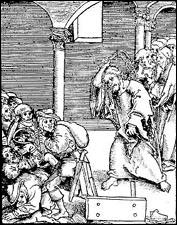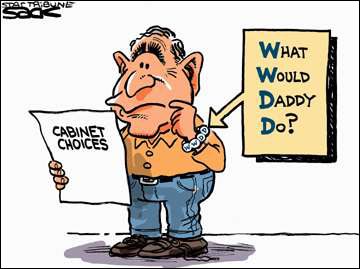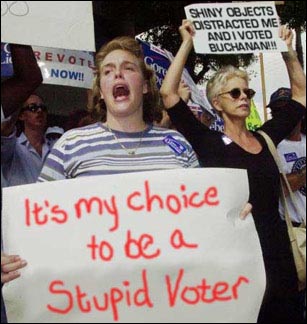|
A political parody is a satirical criticism or mockery of a politician or political party. Although political parodies are humorous, they often reflect or sometimes influence public opinion. The artists and comedians who create these parodies frequently concentrate on a particular embarrassing moment or physical feature of political candidates that is not very favorable. The politicians become characters instead of real people. For instance, when former vice president Dan Quayle misspelled potato, doubts about his intellectual prowess were in every newspaper cartoon, late night monologue, and morning radio show. Quayle was never able to change that public image. Years later, in his failed attempt at a Republican presidential nomination, his "potato moment" was still not forgotten by the public. The voters' image of him as unintelligent could very well have contributed to his failed presidential bid. Satirical criticisms, although humourous, can have serious consequences. Political parodies can take a number of forms. The cartoon is the oldest
type of parody. For centuries, artists and activists have resorted to
pen and paper to voice their opinions. The introduction of the radio
in the 1920's provided yet another media to criticize politicians. Television
became a household appliance in Cartoons The history of political cartoons can be traced back to the 16th century when Martin Luther was advocating major socio-religious reforms through a woodcut adorning a pamphlet he created which criticized the church. Martin Luther's actions caused dramatic changes and although every cartoonist today is not a radical political activist, cartoons still play a significant role in modern politics. In the 1960 presidential election, John F. Kennedy and Richard Nixon proved to be ideal targets for the swift justice of artists' pens. Kennedy's boyish good looks and his young age were often exaggerated by cartoonists of the day. Nixon's long nose, receding hair line, and large jowls were frequently emphasized in political cartoons. Both candidates were also criticized on their respective positions on political issues.
But what really separated the 2000 presidential election from any other election was the fact that a full month after the official election day, no winner could be declared. It could not be easily determined who won the critical electoral votes from Florida. This situation was, in part, due to the fact that many Florida voters claim to have been confused by the arrows on the ballot. Thousands of people who wanted to vote for Gore allegedly voted for Reform party candidate Pat Buchanan and thousands mistakenly punched two holes instead of one, so their ballots were thrown out. This situation fueled a plethora of cartoons about the intelligence of Florida voters. Republicans cartoonists attributed this lack of intelligence to the voters being Democrats. Democratic cartoonists viewed the confusion as a deliberate right wing conspiracy. This theory was spurred on by the fact that George W. Bush's brother Jeb is the governor of Florida. Daily political cartoons can be accessed on the world wide web. In addition, dozens of homemade graphics and cartoons portraying confusing ballots and other election mix-ups are widely available on the web. An important element to note is that many cartoons are now placed on websites or sent via email, regardless of author's permission. Some consider this to be a non-issue, while others hold it to be an important copyright violation. In many cases it's difficult to distinguish between homemade images meant for public display and those crafted by a professional who wish their work to remain only in one location. Television The television became a common household appliance in the mid 1950's, and at least 88% of American households had television sets by 1960. The combination of live action and sound produced a new kind of parody, the satirical skit. 1960 also marked the first year of a televised presidential debate. Americans were able to see the candidates in full motion and sound. Mannerisms, styles of dress, and posture were all of a sudden topics of conversation. This new way to look at the candidates provided comedians with better material to imitate them. Impersonation became a more appealing career. Today late night talk shows consistently make references to politicians. The problematic 2000 presidential election was the topic of many monologues. David Letterman's famous Top Ten List is frequently about the current state of political affairs and the Daily Show regularly exaggerates the flaws of political candidates. Everyday television programs present the public with caricatures of America's leaders. Although these images are often humorous and usually based on at least a half truth, many people begin to believe these exaggerated characteristics are real. World Wide Web The creation of the Internet and subsequently the world wide web significantly impacted the way people communicate. People from around the world are now able to correspond, hear and sometimes see each other in real time. The effect of the web on political parodies has been less dramatic. There are hundreds if not thousands of sites on the web dedicated to mocking and ridiculing political candidates. Some of these sites go so far as to imitate the design and structure of the official site of the candidate they are mocking. An example of this is a satirical site aimed at George W. Bush. This site is updated frequently and changes as the official Bush site changes.
Parody Bibliography 1: A Brief History of Political Cartoons - http://xroads.virginia.edu/~MA96/Puck/part1.html (last viewed December 10, 2000) Picture Sources* 1: Protestant Cartoon, from http://xroads.virginia.edu/~MA96/Puck/part1.html 2: WWDD Cartoon, Steve Sacks, Minneapolis-St. Paul Star-Tribune 3: Altered photograph, Author(s) unknown. * - These images have been selected to demonstrate certain points having to do with the use of political parody on the web. Images were taken from areas appearing to be in the public domain. If any of these images are yours, and you wish us to remove them, please notify the webmaster immediately.
[ Home ] [ 1960 ] [ 2000 ] [ Comparison ] [ Timeline ] |

 [
[
 the 1950's and comedians were able to perform satirical skits or scenes
about politicians. Today, programs like The Daily Show and Saturday
Night Live regularly imitate and exaggerate the current state of politics.
The newest innovation and perhaps most creative addition to the onslaught
of satire in media has been the world wide web. There are many web sites
dedicated solely for the purpose of mocking politicians. The web is
a unique medium because it allows everyday voters to voice their opinions
potentially to millions of people around the world. In all these forms
that political parodies take, no candidate, party, or political position
is safe. Whether Democrat, Republican, liberal or conservative, there
is satire directed at it. Although not always equally, every public
figure has been the subject of political parodies. Satire has become
a fun and creative way to express personal opinions and sometimes sway
public opinion, and the web has become one of it's best forums.
the 1950's and comedians were able to perform satirical skits or scenes
about politicians. Today, programs like The Daily Show and Saturday
Night Live regularly imitate and exaggerate the current state of politics.
The newest innovation and perhaps most creative addition to the onslaught
of satire in media has been the world wide web. There are many web sites
dedicated solely for the purpose of mocking politicians. The web is
a unique medium because it allows everyday voters to voice their opinions
potentially to millions of people around the world. In all these forms
that political parodies take, no candidate, party, or political position
is safe. Whether Democrat, Republican, liberal or conservative, there
is satire directed at it. Although not always equally, every public
figure has been the subject of political parodies. Satire has become
a fun and creative way to express personal opinions and sometimes sway
public opinion, and the web has become one of it's best forums. In
the 2000 presidential election, Al Gore and George W. Bush suffered
the same fate. Al Gore's stiff movements, admitted marijuana use, and
"catch phrases" generated a seemingly endless amount of material for
cartoonists. Like Dan Quayle, Bush was often portrayed as not being
very intelligent. In addition to that, Bush's father is a former president
and cartoonists did not hesitate to create a dependency issue.
In
the 2000 presidential election, Al Gore and George W. Bush suffered
the same fate. Al Gore's stiff movements, admitted marijuana use, and
"catch phrases" generated a seemingly endless amount of material for
cartoonists. Like Dan Quayle, Bush was often portrayed as not being
very intelligent. In addition to that, Bush's father is a former president
and cartoonists did not hesitate to create a dependency issue.  Of
course all the satirical web sites on the web are not aimed at Bush.
There are a number of very creative sites directed towards Al Gore and
his supporters. Some web pages even have games where visitors to the
site can distort the faces of the candidate or make them dance. However,
there are more serious satirical sites. One site is making an earnest
effort not only to kick Bill Clinton out of the White House, but also
to prevent Al Gore from taking any further legal action in his bid for
the presidency. The site includes games and cartoons, but there is a
clear political agenda, it is not just for fun. Political parodies have
been a part of American culture for hundreds of years and as technological
innovations increase, so will the means by which comedians, commentators,
and artists have to critique the state of politics.
Of
course all the satirical web sites on the web are not aimed at Bush.
There are a number of very creative sites directed towards Al Gore and
his supporters. Some web pages even have games where visitors to the
site can distort the faces of the candidate or make them dance. However,
there are more serious satirical sites. One site is making an earnest
effort not only to kick Bill Clinton out of the White House, but also
to prevent Al Gore from taking any further legal action in his bid for
the presidency. The site includes games and cartoons, but there is a
clear political agenda, it is not just for fun. Political parodies have
been a part of American culture for hundreds of years and as technological
innovations increase, so will the means by which comedians, commentators,
and artists have to critique the state of politics.